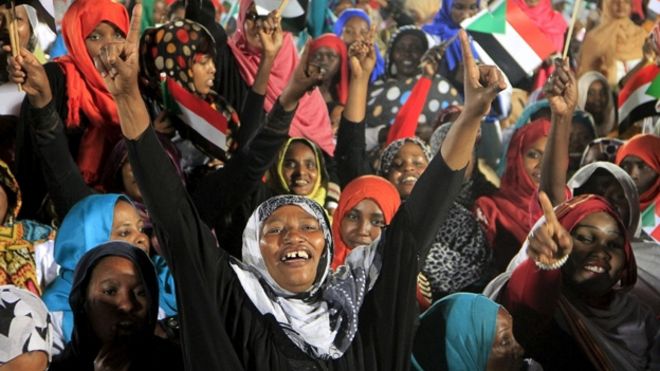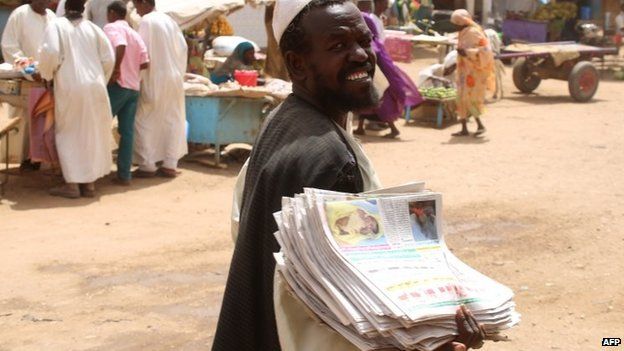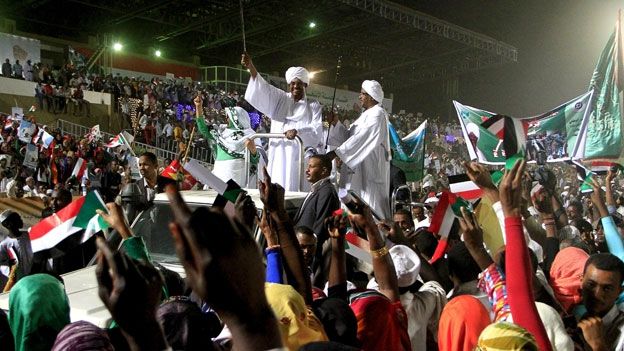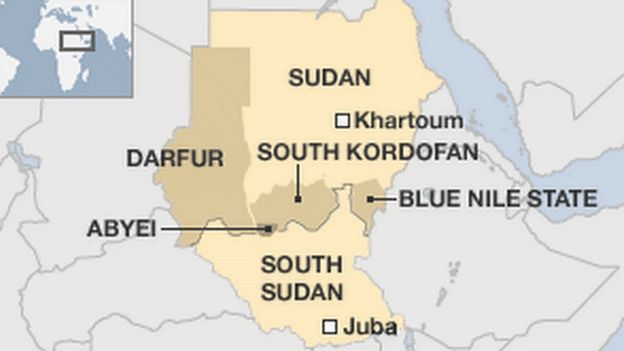Sudan election: Will Bashir be snubbed by his people?

The thousands of people filing into Khartoum Stadium for President Omar al-Bashir's last campaign rally wanted the world to know: This Sudanese election is vital.
They danced, and sang, and shouted themselves into a frenzy when the man himself appeared in the stadium.
"It is my national duty to vote," said one fan, making it clear that his cross would go in the president's box.
But for many others these elections - with voting from Monday to Wednesday - are devoid of meaning.
"We need change in our country," one man said, as he waited for a bus near the rally.
"There is mass corruption here, inflicted by this regime. We deserve a better life."
A change - of political leadership at least - is highly unlikely to come via the ballot box.
Almost all the opposition parties are boycotting the polls, leaving Mr Bashir and his National Congress Party (NCP) a practically unimpeded run at an overwhelming majority.
In fact, the NCP is so confident that is not running candidates in 30% of the constituencies, to allow the political parties which are contesting the election to garner some MPs.
So why did most of the opposition call for a boycott?
Detained politicians
In January 2014, President Bashir announced a national dialogue - a conversation about how Sudan should be governed.
It seemed opportune, after decades of poor governance and almost continuous civil war, in various parts of the country.
Yet no real talks have taken place.
 The media is muzzled in Sudan though private papers enjoy more freedom than the state media
The media is muzzled in Sudan though private papers enjoy more freedom than the state mediaMost opposition parties feel the much needed dialogue is impossible while opposition leaders are detained, the press is muzzled, and conflicts persist in Darfur, South Kordofan and Blue Nile.
For what it is worth, many Western countries agree.
The US, the UK and Norway, collectively known as the "Troika", have expressedtheir "great disappointment that a genuine national dialogue has not begun in Sudan and that an environment conducive to participatory and credible elections does not exist".
The European Union made a similar statement - after which its envoy to Sudan was summoned by the authorities to explain itself.
President Bashir has made political capital out of a perceived Western antipathy towards him - which is sometimes portrayed as an attack on Islam, or on Sudan as a whole.
Concessions
This reached new heights after Mr Bashir was indicted by the International Criminal Court (ICC) for genocide and other crimes allegedly committed in Darfur. He denies the allegations.

Sudan election:
President Omar al-Bashir is up against 15 little-known candidates
44 parties are taking part in the parliamentary poll
Key issues:
US relations - lifting economic sanctions and getting the country removed from the list of state sponsors of terrorism
Securing peace - there is fighting in the western Darfur, South Kordofan and Blue Nile
Economy - when the South Sudan seceded, the country lost most of its vital oil revenues
How Sudan's election works
President Bashir has received support in Africa and the Arab world, and it is likely that many African and Arab countries will be more open to the elections than their Western counterparts.
In the run up to the vote, the authorities made what some would see as a much overdue concession.
Last week, Farouk Abu Issa, a veteran opposition politician, and Amin Makki Madani, the head of a civil society coalition, were released.
They had been held since December, after they signed an agreement with the Sudan Revolutionary Front rebel coalition.
 The Justice Party is one of 44 political parties are taking part in the election
The Justice Party is one of 44 political parties are taking part in the election President Bashir gets the crowd going with his signature stick waving
President Bashir gets the crowd going with his signature stick wavingThis prospective alliance of the armed and unarmed opposition is deeply concerning for President Bashir and his supporters.
Already some of the rebels have suggested they will try to disrupt the polls.
In several parts of South Kordofan the vote will not take place, because those areas are held by the Sudan People's Liberation Army-North (SPLM-N) rebels.
It is not clear how it will be possible to vote in parts of Darfur and Blue Nile too.
The opposition have also launched their "irhal" or "leave" campaign, calling on the Sudanese to boycott the vote.
That means that although the result is not in doubt, it will be important to monitor the turnout.
Improving US relations?
The international reaction to the vote will also be interesting.
At the last election in 2010, it was clear there were numerous irregularities - but these were largely passed over because of the upcoming referendum on southern Sudanese independence.

Western countries, in particular, were keen not to put that referendum at risk by criticising a poll which entrenched the NCP in Sudan, and the SPLM in what soon became the independent South Sudan.
This time round the West looks much more ready to criticise the elections.
That matters because Sudan wants to improve its relationship with the US.
It also wants to get out from its debt burden which is a decision largely in the hands of Western powers.
President Bashir, the presumptive winner of the polls, may perhaps use this domestic capital to make changes among the leading faces in his party.
But a victory in such one-sided elections may not improve his stock all that much elsewhere in the world.
Comments
Post a Comment